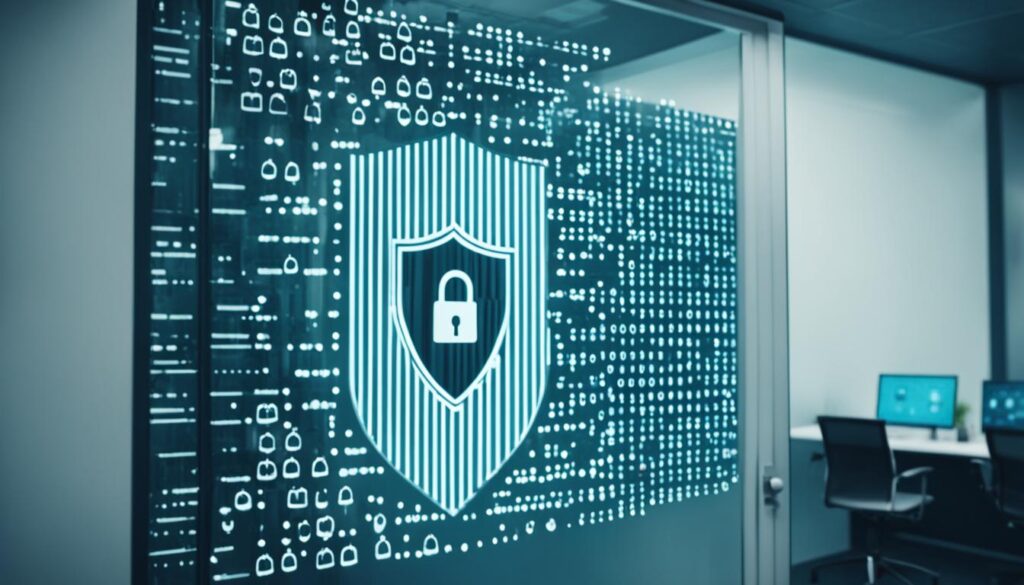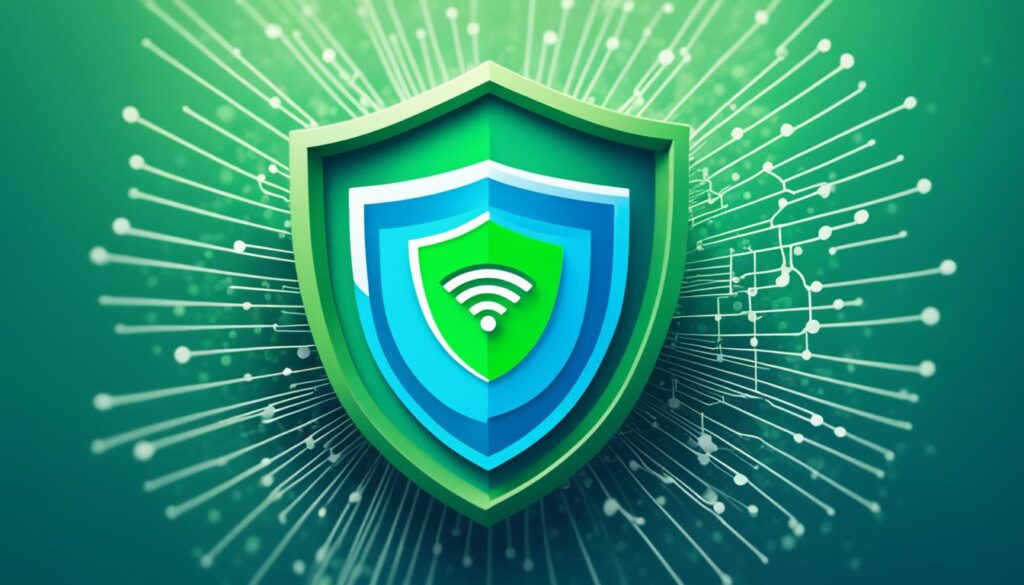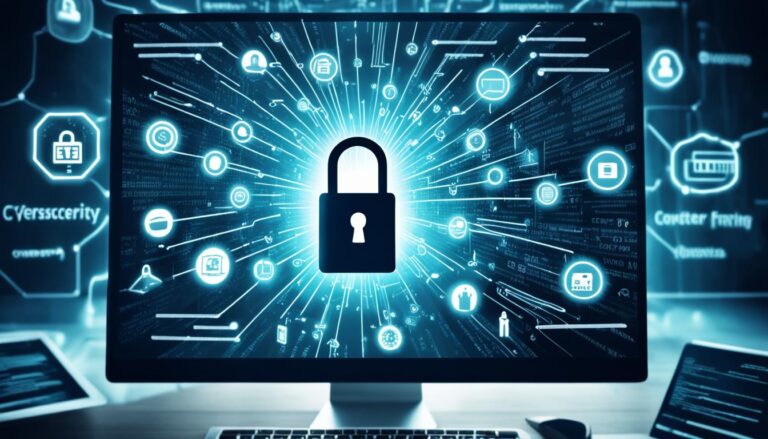
Protecting your small business against cyber threats is essential in today’s digital landscape. As a small business owner, you must prioritize cybersecurity to safeguard your business, customers, and data. By implementing effective cybersecurity measures, you can strengthen your small business defense and mitigate the risk of cyberattacks. In this section, we will explore some actionable tips to enhance your small business cybersecurity.
Key Takeaways:
- Regularly train your employees in security principles to establish a culture of security within your organization.
- Keep your information, computers, and networks protected by installing and updating antivirus software, setting up firewalls, and implementing mobile device action plans.
- Create backup copies of your business data to ensure you can recover it in case of a cyberattack or data loss. Store the copies offsite or in the cloud.
- Control physical access and user accounts by implementing measures like separate user accounts for employees and limiting employee access to data.
- Secure your Wi-Fi networks by enabling encryption, hiding the network name, and password-protecting access to the router.
Importance of Cybersecurity for Small Businesses
Small businesses are highly susceptible to cyberattacks and must prioritize cybersecurity to safeguard their assets and operations. Cyber threats can result in severe financial losses, disrupt business continuity, and damage the company’s reputation in the marketplace. Protecting against online attacks is an essential step in maintaining the viability and success of small enterprises.
Implementing effective cybersecurity measures is crucial in defending small businesses against the ever-increasing number of cyber threats. These measures not only protect sensitive data but also prevent unauthorized access to systems and networks, ensuring the integrity and confidentiality of critical information.
The Risks Faced by Small Businesses
Small businesses face a variety of cyber risks, including:
- Data breaches: Unauthorized access to customer, employee, or financial data can lead to significant financial and reputational damage.
- Ransomware attacks: Malicious actors can encrypt a business’s data and demand payment in exchange for its release, interrupting operations and causing financial strain.
- Phishing scams: Cybercriminals often employ deceptive tactics to trick employees into revealing sensitive information or performing harmful actions.
- Insider threats: Disgruntled employees or individuals with access to the company’s systems can misuse their privileges to steal data or disrupt operations.
The Benefits of Cybersecurity for Small Businesses
Investing in cybersecurity offers several key benefits:
- Protection against financial loss: Implementing robust security measures reduces the risk of financial losses resulting from cyberattacks, such as theft of funds or legal costs associated with data breaches.
- Maintaining business continuity: A strong cybersecurity framework helps prevent disruptions to business operations, ensuring that services can be provided without interruption.
- Safeguarding sensitive customer data: Customer trust is vital to a business’s success. By prioritizing cybersecurity, small businesses can assure their customers that their confidential information is well-protected.
- Preserving brand reputation: Recovering from a cyberattack can be challenging, especially for small businesses. Demonstrating strong security practices fosters confidence in the brand and helps maintain a positive reputation in the marketplace.
By recognizing the importance of cybersecurity and proactively safeguarding their business, small enterprises can minimize the impact of cyber threats and create a secure environment for their operations and stakeholders.
| Common Cybersecurity Measures | Description |
|---|---|
| Firewall Implementation | Establishing a firewall to control and monitor incoming and outgoing network traffic, protecting against unauthorized access. |
| Regular System Updates | Maintaining up-to-date software and system patches to address known vulnerabilities. |
| Employee Training | Providing cybersecurity awareness training to educate employees about potential threats and best practices for data protection. |
| Secure Password Policies | Instituting strong password policies, such as enforcing password complexity and regular password changes. |
| Data Backup and Recovery | Regularly backing up critical business data and implementing a robust data recovery plan to mitigate the impact of data loss. |
Training Employees in Security Principles
Small businesses must prioritize cybersecurity measures to protect their business, customers, and sensitive data. One crucial aspect of a robust cybersecurity strategy is training employees in security principles. By establishing basic security practices and policies, small businesses can create a culture of security within the organization.
Implementing strong password requirements is a fundamental step in minimizing the risk of unauthorized access to critical systems. Employees should be educated on the importance of creating unique, complex passwords and regularly updating them. Additionally, small businesses should provide guidelines for safe internet use to prevent employees from visiting potentially harmful websites or downloading malicious files.
Educating employees on how to handle and protect customer information is vital in maintaining the confidentiality and integrity of sensitive data. Small businesses should emphasize the importance of adhering to privacy regulations and guide employees on secure methods for handling customer data, such as encryption and secure file transfer protocols.
Creating a cybersecurity training program that covers these principles and ensures employees are aware of the latest cybersecurity threats and best practices is essential. Regular training sessions, workshops, and simulations can help employees recognize and respond to potential cyber threats.
Benefits of Training Employees in Security Principles:
- Improved awareness of cybersecurity risks
- Increased ability to identify and report suspicious activities
- Better adherence to cybersecurity policies and procedures
- Enhanced protection of sensitive data
- Reduced likelihood of successful cyberattacks
By investing in employee training and creating a culture that prioritizes cybersecurity, small businesses can build a strong defense against cyber threats.
| Benefits of Training Employees in Security Principles |
|---|
| Improved awareness of cybersecurity risks |
| Increased ability to identify and report suspicious activities |
| Better adherence to cybersecurity policies and procedures |
| Enhanced protection of sensitive data |
| Reduced likelihood of successful cyberattacks |
Protecting Information, Computers, and Networks
Small businesses must prioritize cyber protection to safeguard their information, computers, and networks from online attacks. Implementing cybersecurity measures and keeping systems up to date with the latest security patches is crucial in defending against cyber threats.
One important step in protecting small businesses is to install and regularly update antivirus software. Antivirus software helps detect and remove malicious software that can compromise the security of computers and networks.
Firewall security is another essential cybersecurity measure. Small businesses should set up firewalls to monitor and control incoming and outgoing network traffic, preventing unauthorized access and protecting sensitive information.
Furthermore, implementing mobile device action plans helps mitigate the risk of cyberattacks on small businesses. This involves securing mobile devices used by employees, such as smartphones and tablets, by enabling encryption, requiring strong passwords, and implementing remote wipe capabilities in case of loss or theft.
By taking these proactive cybersecurity measures, small businesses can significantly enhance their defense against cyber threats and minimize the risk of data breaches and other online attacks.

| Cybersecurity Measure | Description |
|---|---|
| Antivirus Software | Install and regularly update antivirus software to detect and remove malware. |
| Firewall Security | Set up firewalls to monitor and control network traffic for unauthorized access prevention. |
| Mobile Device Action Plans | Secure mobile devices with encryption, strong passwords, and remote wipe capabilities. |
Creating Backup Copies of Business Data
Regularly backing up important business data is essential in case of a cyberattack or data loss. Small businesses need to prioritize backing up critical data such as documents, spreadsheets, databases, and financial files to ensure its safety and availability. By implementing a robust backup strategy, small businesses can protect themselves from potential data breaches and minimize the impact of cyber threats.
It is recommended to backup data automatically and store the copies offsite or in the cloud. Storing backups offsite reduces the risk of physical damage or theft to the backup media. Cloud storage provides added convenience, scalability, and disaster recovery capabilities. Small businesses can leverage various backup solutions and services tailored to their needs, such as cloud backup providers or external hard drives.
Backup Frequency and Restoration Testing
Small businesses should establish a regular backup schedule based on the frequency of data updates and business operations. Backups can be performed on a daily, weekly, or monthly basis, depending on the criticality of the data and the rate of change. It is crucial to consider both the recovery point objective (RPO) and recovery time objective (RTO) when defining the backup strategy.
Regular restoration testing should also be conducted to ensure the backup copies are valid and can be restored successfully. This testing allows small businesses to identify any issues with the backup process or the backup media before they encounter a real data loss situation.
Backup Security
Protecting backup copies from unauthorized access is essential for maintaining the integrity and confidentiality of the data. Small businesses should implement strong access controls and encryption measures to safeguard the backup files. Encryption can prevent unauthorized users from accessing sensitive information even if the backup media is lost or stolen.
Backup Documentation
It is important for small businesses to maintain clear and up-to-date documentation of their backup procedures, including the location of backup copies, the frequency of backups, and the restoration process. This documentation helps streamline recovery efforts and ensures that backups are consistent and reliable.
By creating backup copies of business data and implementing a comprehensive backup strategy, small businesses can safeguard their critical information and minimize the impact of potential cyber threats or data loss incidents.
Controlling Physical Access and User Accounts
Securing small businesses from online attacks requires a proactive approach to cybersecurity. One essential aspect is controlling physical access to business computers and establishing separate user accounts for each employee. By implementing these measures, small businesses can minimize the risk of insider threats, unauthorized access, and potential cyber breaches.
Limiting employee access to sensitive data and granting authority to install software can significantly bolster small business cybersecurity. By implementing a hierarchical access system, businesses can ensure that employees only have access to the information necessary to perform their job functions. This helps prevent unauthorized access to critical business systems and data.
Separate user accounts also play a vital role in enhancing cybersecurity. By assigning unique user accounts to employees, businesses can track individual activities and hold accountable any employee found engaging in malicious activities. Furthermore, if a user account is compromised, the scope of the breach can be limited to that account, minimizing the overall impact on the organization.
In addition to physical access control and user account management, small businesses should also consider implementing multi-factor authentication for added security. This authentication method requires users to provide two or more forms of identification, such as a password and a unique code sent to their mobile device, to access sensitive information or systems. This additional layer of security adds an extra barrier against unauthorized access attempts and strengthens the overall cybersecurity posture of the business.
| Benefits of Controlling Physical Access and User Accounts |
|---|
| Minimizes the risk of insider threats |
| Reduces the likelihood of unauthorized access |
| Enables tracking and accountability for employee actions |
| Limits the impact of compromised user accounts |
| Strengthens overall cybersecurity |
By implementing effective physical access control measures and user account management, small businesses can significantly enhance their cybersecurity defenses. These strategies, combined with other cybersecurity best practices, create a comprehensive defense strategy that safeguards against online attacks and protects sensitive business information.
Securing Wi-Fi Networks
Securing the Wi-Fi network is of utmost importance for small businesses to ensure cyber protection and safeguard against potential threats. By implementing the following cybersecurity tips, small businesses can enhance their defenses and protect their valuable data.
1. Enable Encryption: It is vital to enable encryption on the Wi-Fi network to protect sensitive information from being intercepted by unauthorized users. Encryption protocols such as WPA2 or WPA3 provide a secure connection and help prevent eavesdropping on network traffic.
2. Hide the Network Name (SSID): By hiding the network name, also known as the Service Set Identifier (SSID), small businesses can add an additional layer of protection. This prevents potential attackers from easily identifying and targeting the Wi-Fi network.
3. Password Protect the Router: Ensure that the Wi-Fi router is password protected with a strong, unique password. Avoid using default passwords provided by the manufacturer, as they are often easy to guess. A strong password consists of a combination of uppercase and lowercase letters, numbers, and special characters.
By implementing these measures, small businesses can significantly reduce the risk of unauthorized access to their Wi-Fi network, limiting network vulnerabilities and protecting valuable data from cyber threats.

Best Practices for Payment Cards
When it comes to small business cybersecurity, protecting payment card information is of utmost importance. Implementing best practices can help safeguard your customers’ sensitive data and maintain the trust and reputation of your business. Follow these tips to ensure secure payment card transactions and defend against cyber threats.
Work with Trusted Banks or Processors
Partnering with reputable banks or processors is crucial for small businesses to ensure the use of validated anti-fraud services and secure payment card tools. Establishing a trusted relationship can provide additional layers of protection for your business and customers.
Isolate Payment Systems
Isolating payment systems from other less secure programs helps minimize the risk of unauthorized access and potential data breaches. By segregating these systems, you can limit the impact of a cyberattack and prevent the spread of malware to other parts of your network.
Separate Payment and Browsing Activities
Avoid using the same computer for processing payments and internet browsing. By separating these activities, you can reduce the risk of malicious software compromising your payment processing software or capturing sensitive information during online activities.
Secure Access to Payment Devices
Physical security measures play a crucial role in small business cybersecurity. Make sure that the devices used for accepting payments, such as card readers and point-of-sale systems, are securely placed and protected from unauthorized tampering or access.
Regularly Monitor and Review Transactions
Keeping a close eye on payment transactions is essential for quickly identifying any suspicious activity or potential fraud. Regularly review and reconcile your payment records to ensure accuracy and detect any unauthorized charges.
Implement Strong Authentication
Using multi-factor authentication adds an additional layer of security to your payment systems. Require employees who have access to payment information to use strong, unique passwords and utilize additional authentication factors, such as one-time passcodes or biometric verification.
Train Employees on Payment Security
Providing comprehensive training to your employees is essential in ensuring small business cybersecurity. Educate them about the importance of protecting payment card information, how to identify potential security risks, and the proper handling of sensitive data.
By following these best practices for payment cards, you can significantly enhance your small business cybersecurity measures and protect both your business and your customers from cyber threats.
Passwords and Authentication
Implementing strong password policies, requiring regular password changes, and considering multi-factor authentication are important steps to enhance small business cybersecurity. By ensuring unique passwords that are changed periodically, and incorporating additional authentication factors, small businesses can add an extra layer of protection against unauthorized access.
Strong Password Policies
- Encourage employees to create passwords that are at least 12 characters long and contain a combination of uppercase and lowercase letters, numbers, and symbols.
- Discourage the use of easily guessable passwords, such as birthdays, names, or common phrases.
- Implement password complexity requirements to ensure employees create strong and secure passwords.
Regular Password Changes
- Require employees to change their passwords at regular intervals, typically every 90 days.
- Educate employees about the importance of regularly updating their passwords to minimize the risk of unauthorized access.
- Consider implementing a password expiration policy that automatically prompts users to change their passwords after a certain period.
Multi-Factor Authentication
- Enable multi-factor authentication (MFA) for all applicable systems, applications, and accounts.
- MFA adds an extra layer of security by requiring users to provide additional authentication factors, such as a fingerprint scan or a code sent to their mobile device, in addition to their password.
- Choose MFA methods that align with the needs and capabilities of your small business, considering factors such as ease of use and level of security.
By implementing strong password policies, enforcing regular password changes, and adopting multi-factor authentication, small businesses can significantly enhance their cybersecurity measures and protect their sensitive data.
Importance of CEO and Leadership Involvement
Establishing a culture of security within an organization is crucial to safeguarding small businesses from cyber threats. CEOs play a critical role in this process as they have the power to set cybersecurity objectives that align with business goals. By actively participating in tabletop exercises and reviewing and approving the incident response plan, CEOs demonstrate their commitment to protecting the company against online attacks. Furthermore, CEOs must ensure that IT leaders receive the necessary support to enforce cybersecurity measures effectively. Without strong leadership involvement, small businesses are more vulnerable to cyber threats.
- Setting clear cybersecurity objectives aligned with business goals
- Actively participating in tabletop exercises to simulate cyberattack scenarios and test the organization’s response
- Reviewing and approving the incident response plan to ensure its effectiveness
- Providing the necessary support for IT leaders to implement and enforce cybersecurity measures
By actively engaging in these practices, CEOs can create a security-conscious environment within their organization and protect their small business from online attacks.
IT Responsibilities for Small Business Cybersecurity
When it comes to small business cybersecurity, IT leads play a crucial role in implementing effective measures and protecting the organization from cyber threats. By mandating the use of multi-factor authentication, IT leads can significantly enhance the security of small business systems and networks. Multi-factor authentication adds an extra layer of protection by requiring users to provide multiple credentials, such as a password and a unique code sent to their mobile device.
Another important responsibility for IT leads is to enable disk encryption for laptops used within the organization. Disk encryption ensures that sensitive data stored on laptops is encrypted and cannot be accessed by unauthorized individuals. In the event of a lost or stolen laptop, encryption helps prevent unauthorized access to valuable business information.
Regularly patching software and systems is essential for small business cybersecurity. IT leads should stay up to date with the latest security patches and updates provided by software vendors. By promptly applying these patches, small businesses can address known vulnerabilities and reduce the risk of cyberattacks.
Performing regular backups and testing their effectiveness is also a crucial task for IT leads. Backing up important business data protects against data loss caused by cyberattacks or system failures. IT leads should ensure that backups are performed regularly and stored in secure locations, such as offsite or in the cloud. Regular testing of backups helps guarantee that the data can be successfully restored when needed.
Lastly, IT leads should revoke administrator privileges from user laptops to minimize the risk of unauthorized access and unauthorized software installations. By limiting administrative privileges, small businesses can prevent potential threats from taking advantage of elevated user privileges and better control the system’s overall security.






